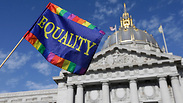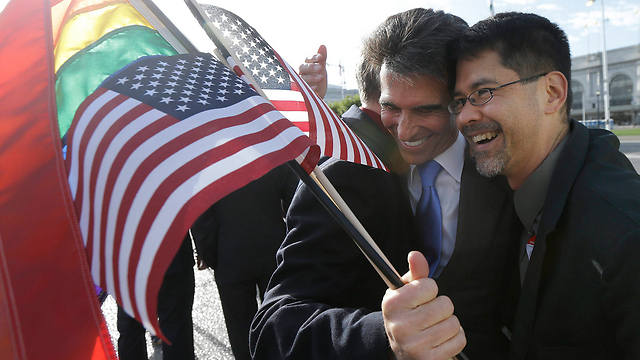
We should welcome progressive rulings, but know that they don't always help
צילום: AP
America's double identity: Equality vs. social gaps
Op-ed: Court rulings may win praise, but the American experience shows they don’t change a social reality; sometimes the legal battle comes at the expense of the real battle.
It's a historic ruling: The Supreme Court of the United States has decided to recognize same-sex marriage. It's no longer a decision made by individual states; it's a decision which binds all states. It's a decision which really validates the constitution, which has been lasting for more than 200 years now.

Like in previous dramatic decisions, the breakthrough was not made by the court. Until 2009, there was a majority in the US against same-sex marriage. As of 2010, there is a majority in favor of same-sex marriage. Only a decade ago, in 2005, about 59-68% were against it. In 2015, the support rate is 59-63%. The court didn't lead – it adjusted itself to the changes in the public opinion, which were reflected in some of the states' legislation.
This wonderful introduction only stresses one of the most fascinating characteristics of the US: It's a country with a double identity. The head is in the clouds, the legs are deep in the mud. The country is led by a black person, but in many places in the US – not just in Ferguson – black people are still beaten up, sometimes to death, mainly because they are black. The greatness of equality and human rights in their throat, and the sword of oppression in their actions.
Serene and luxurious neighborhoods are located only several hundred meters away from violence-ridden slums. According to a study conducted in 2013, a white family has 13 times more property compared to a black family. The gaps were slightly reduced from 2007 to 2010, but everything that was achieved has been erased, and the gaps are growing.

Celebrating same-sex marriage ruling. It's not entirely clear that the American model is so wonderful (Photo: AP) (צילום: AP)
So the Supreme Court ruling deserves every word of praise. It does not bypass the constitution. On the contrary, it is a real and practical expression of the constitution.
But it's not entirely clear that the American model is so wonderful. In France, for example, there is no chance for a black president, at least not in the foreseeable future. But down, on the ground, the black people are much more integrated. Mixed couples are a rare thing in the US, and a routine matter in France. There is discrimination in France, but it's not color-based – it's culture-based. There is blatant discrimination against Muslims, regardless of the color of their skin. There is a lot less discrimination against black people, as long as they are not Muslim.
President Barack Obama's emotional speech following the ruling is part of that double identity of the American entity. Obama's inaugural address was also impressive. A historic landmark. A dawn of a new era. Within a generation and a half, the US made a leap from denying black people's right to vote to voting for a black president. But the black president, who was reelected, reached his seventh year without recording any improvement in the black people's situation. On the contrary, they feel that the change at the top did not penetrate the ground.
The data confirm the feelings. The landmarks of equality – a black president, same-sex marriage – are the display window. In the backyard, opposite things are happening. The big hopes are being shattered. The gaps have grown not only between white and black people, but also between white and Hispanic people, whose situation is closer to the situation of black people.
The rights discourse nurtures, among other things, the equality before the law. As we climb up the law authorities in the US, this equality is more apparent. In Israel too, following the judicial activism, some of the battles for equality move over to the High Court. The rulings win praise, but the American experience shows that, with all due respect, rulings don’t change a social reality. Sometimes they even do the opposite. The legal battle comes at the expense of the real battle.
The same happens in Israel: The court has defended, for example, certain rights of asylum seekers, but the residents of south Tel Aviv are sometimes the ones who lose. They are paying the price.
So we should welcome progressive rulings, but we should also know that they don't always help.










